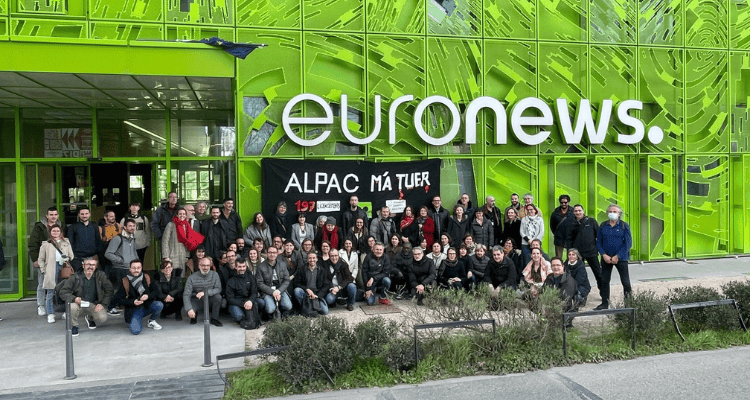Euronews: public-interest journalism in jeopardy

This op-ed was published on the Social Europe website.
By Oliver Roethig and Ricardo Gutiérrez
The aspiration for a quality news platform that draws Europe together is being suffocated. In the wake of the takeover last year of Euronews, an editorial overhaul and mass layoffs are being pressed by its new owner.
In 1993, Euronews was created by national public broadcasters as a European response to the ‘CNN effect’—how news channels were increasingly shaping public and political opinion. A broadcaster with a public mission at its heart was the vision, the choice to construct a freely-accessible, multilingual European alternative, in the hands of the public, a political one.
The editorial board thus comprised representatives of Europe’s public broadcasters. Thanks to major public investments, the channel now broadcasts in 160 countries with more than 400 million households, reaching more than 145 million people every month.
Significant controversy
Less than a decade after ceding majority ownership to private investors, things have however taken a dramatic turn. In July 2022, ALPAC Capital took a controlling, 88 per cent, stake in Euronews, paying an undisclosed fee and causing significant controversy. The Portugal-based investment fund has close ties to Hungary’s far-right prime minister, Viktor Orbán.
Major changes have been announced to Euronews’ funding model. While the channel still receives public funds, including via its Framework Partnership Agreement with the European Commission, the new management intends to make it self-financing by the end of this year.
From the outset, the potential of Euronews to shape policy was recognised. The initial vision was that this power to construct a Europe-wide point of reference should be wielded by accountable public bodies. Today, while the policy impact may not be nullified, that vision has been betrayed.
Mass layoffs
Media professionals have made the channel a success: the quality of content they produce, based on their reporting, has built the reputation of the broadcaster. Yet management has announced its intention to lay off most of the permanent staff—197 out of 349—at the Lyon headquarters. The institutional knowledge of the public-mission heritage of Euronews would thereby be erased.
Staff will be dispersed from the central hub to smaller national offices. Yet management is recruiting for similar positions to those occupied by the workers to be laid off. Instead of offering redeployment opportunities, and so maintaining the experience and know-how specific to a multi-language channel, there are to be many new hires.
This atomisation suggests a dramatic change in approach. The strength of Euronews was that staff from different countries were shaping its daily content together, from within the same headquarters building. They produced uniform-quality content, broadcast in multiple languages simultaneously. This cohesive approach is now called into question.
With the mass layoff, even the multilingual nature of Euronews is undermined. In a massive step backwards, management has indicated that, due to its gutting of the workforce, weekend broadcasts will be only in English.
Taking action
Today, the workers of Euronews are taking action. The Intersyndicale trade union alliance of SNJ, SNRT-CGT, SNJ-CGT and CFE-CGC has already led strikes at the beginning of February and in mid-March.
The discussions with management are stuck. The priorities for the Intersyndicale in this struggle are: to reduce the number of redundancies, improve conditions of departure, ensure redeployment and guarantee good working conditions for those who remain. The battle they are leading today is of course about secure and sustainable jobs in the media sector—but it is also for European public-interest media, in the hands of the public.
The European Commission has been a major funder of Euronews since day one. Over the past three decades it has invested hundreds of millions of euro in building European media. It cannot allow the new owner to asset-strip Euronews, selling its building, dismissing staff and endangering its reputation.
We call on the European Union to be consistent. It cannot defend the adoption of the European Media Freedom Act and promote media pluralism while at the same time passively watching Euronews die.
‘Fourth estate’
The press that specialises in EU policy is already dominated by donors with strong vested (mostly for-profit) interests in shaping policy. When these interests are allowed to assume more of a say in shaping the policy narrative, the democratic nature of the European project is at stake. The EU institutions cannot allow the product of their years of investment to be scrapped or driven off a public-interest course.
The ‘fourth estate’ is crucial to the upkeep of democracy. It is time to put media independence, transparency and accountability—and job security—at the centre of the European public sphere. It is time to save Euronews.






